Student Organizations
Edward H. Heinze, chair of the economics department, served from 1978-1991. On July 12, 1991, he was tragically killed in an automobile accident. The Valparaiso University community was deeply shocked and saddened by this tragic loss of their beloved colleague and decided to establish a memorial scholarship fund in honor of his contributions to economics students and the university.
The Edward H. Heinze student scholarship is awarded annually to the most deserving junior economics major based on (1) financial need and (2) highest GPA in economics. The candidate will be chosen by the financial aid director in consultation with the economics department chair.
Heinze Scholarship Winners
- 1995–1996 Jason Woodruff
- 1996–1997 Eric Sygnatur
- 1997–1998 Sarah Malone
- 1998–1999 Lauren Miller, Sarah Burow
- 1999–2000 Karl Kindler, Andrew Swiston
- 2000–2001 Mark Santos
- 2001–2002 Matthew Landmeier
- 2002–2003 Elyssa Swango
- 2003–2004 Katherine Gappa, Dana Reid, Andrew Remenschneider
- 2005–2006 Robert Schmidt
- 2006–2007 Liberty Zieghan
- 2007–2008 Kate Pawlus
- 2008–2009 Daniel Klosowski
- 2009–2010 Heather Koenig
- 2010–2011 David Page
- 2011–2012 David Page
- 2013–2014 Amanda McCullough
- 2013–2014 Brock Taulbee
- 2014-2015 Matthew Mundt
- 2015-2016 Amber Haack
- 2016-2017 Mordecai Benson
- 2017-2018 Michael Wheeler
- 2018-2019 Joshua Ferguson
Omicron Delta Epsilon is an international academic honor society that was created through the merger of two honor societies, Omicron Delta Gamma and Omicron Chi Epsilon.
Omicron Delta Gamma (The Order of Artus) was founded in 1915 by John R. Commons, University of Wisconsin and Frank Taussig, Harvard University.
Omicron Chi Epsilon was founded in 1955 by Alan A. Brown while he was a student at the City College of New York.
Omicron Delta Epsilon has more than 578 chapters located in the United States, Canada, Australia, the United Kingdom, Mexico, Puerto Rico, South Africa, Egypt, and France.
The requirements for admission for undergraduates are:
- Completion of at least 12 credit hours of economics courses with a GPA of 3.0 or higher in all economics classes
- Attainment of an overall GPA of 3.0 or higher
A student does not need to be an economics major to apply, but the student must have a genuine interest in economics in addition to meeting the above requirements.
The Valpo chapter of Students in Free Enterprise (SIFE), which is now known as Enactus, captured the Rookie of the Year and First Runner-up awards on their first trip to the organization’s regional competition in Chicago in 2004. Later, Valpo-SIFE clinched the regional title in Chicago.
Valpo-SIFE members not only taught computer skills to senior citizens but also provided in-home computing help. Other activities included organizing seminars on entrepreneurship, personal finance, and identity theft. Elementary school students benefited from their presentations on market economics and business. Creative business plans were developed for local businesses.
While the local community reaped the benefits of services provided by Valpo SIFE members, an international outreach to fledgling entrepreneurs in developing countries also advanced through Valpo SIFE’s networking efforts with Kiva.
Kiva is an organization that connects people who live in underprivileged areas and want loans to people who desire to fund the projects. As potential lenders browse Kiva’s website (kiva.org), they choose someone to lend to, then make a small loan in the amount of $25-$100 using PayPal. Kiva restricts loan amounts, so no one person has sole control over an entrepreneur.
“For example, you have a person who would like to start a business selling firewood, and they need money to buy a cart to haul it to market,” explains Jaishankar Raman, Ph.D., associate professor of economics and SIFE advisor. “It’s a way to get loan sharks out of the picture.”
Professor Raman was first introduced to Kiva two years ago when he saw it on “Frontline,” a PBS documentary. He began using it in his economic development class. He put $100 in, and the class picked three projects. Each month, they revisit their investment to check the status. When the loan is repaid, they reinvest in another.
“These are hard-working people who don’t want to cheat you,” Professor Raman said.
It has become a family tradition for Professor Raman’s sons, Shyam, 9, and Sunjay, 6, to choose from Kiva’s list of entrepreneurs to receive a portion of their birthday money, donated by mom and dad. They have the joy of knowing their money is going to improve someone’s life. Their first Kiva loan has been repaid, and they are excited about choosing another.
